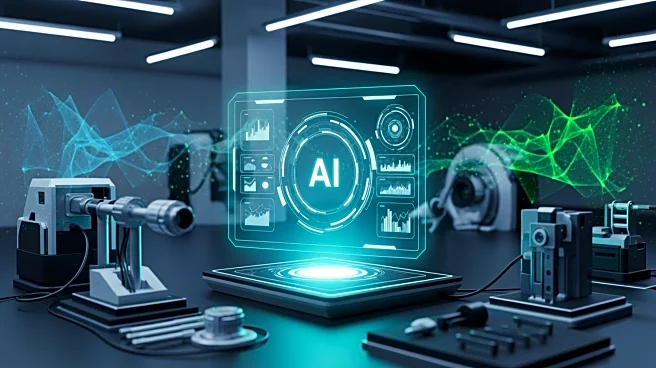What's Happening?
Manufacturers in the U.S. are increasingly adopting AI technologies to improve their sales operations, according to a survey by Aleran Software. The survey indicates that 91% of B2B manufacturers have implemented or plan to implement AI-powered sales automation.
This shift is aimed at modernizing quoting, pricing, and customer interaction processes that have remained largely unchanged for decades. AI is being used to automate repetitive tasks, allowing sales reps to focus on high-value deals and strategic growth. AI-driven tools are enhancing product discoverability and sales assistance, transforming basic chatbots into sophisticated AI sales assistants that can answer technical questions and recommend compatible products.
Why It's Important?
The adoption of AI in manufacturing sales is significant as it addresses the challenges posed by supply chain uncertainties, tariffs, and increasing customer demands for speed. By leveraging AI, manufacturers can respond faster, quote smarter, and scale efficiently, providing a competitive edge in the market. AI-powered systems are enabling manufacturers to capture qualified, intent-driven buyers more effectively, thereby improving sales margins and accelerating deal cycles. This technological advancement is crucial for manufacturers operating in configure-to-order environments, where personalized customer interactions are essential.
What's Next?
The future of AI in manufacturing sales is expected to evolve from automation to orchestration. Emerging agentic AI systems will autonomously handle multi-step workflows, from generating quotes to verifying credit and triggering production. This development will further streamline sales processes, providing full visibility for human oversight while enhancing efficiency. Manufacturers are likely to continue investing in AI technologies to maintain a competitive edge and meet modern commerce demands for faster quoting and richer personalization.
Beyond the Headlines
The integration of AI in manufacturing sales is not about replacing human roles but amplifying their impact. By automating routine tasks, AI empowers sales teams to focus on building deeper relationships and pursuing strategic growth opportunities. This human-centered approach to AI adoption reflects a broader trend in the industry towards enhancing human capabilities rather than diminishing them.















